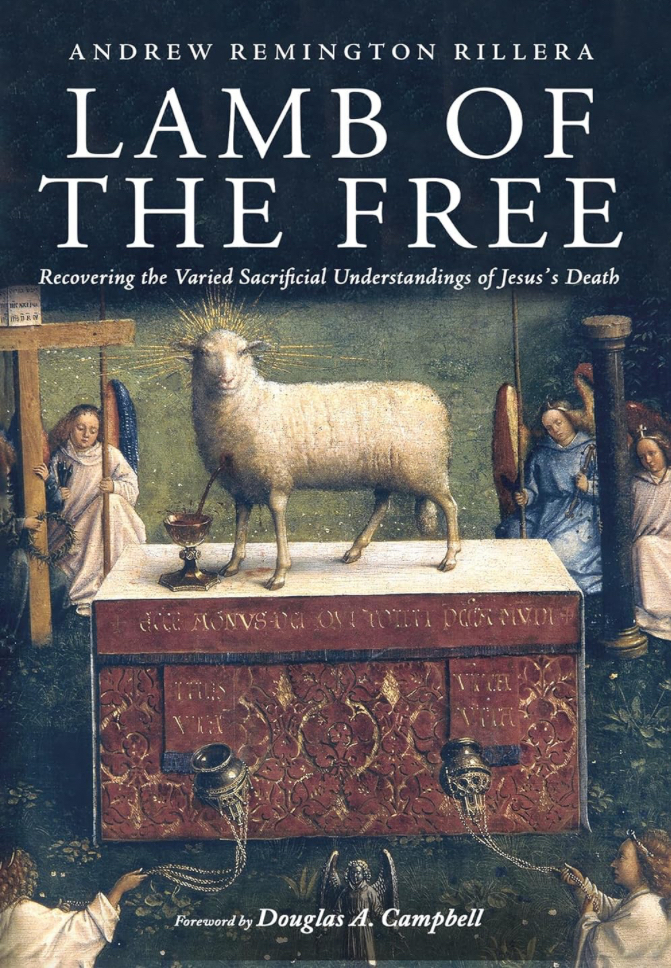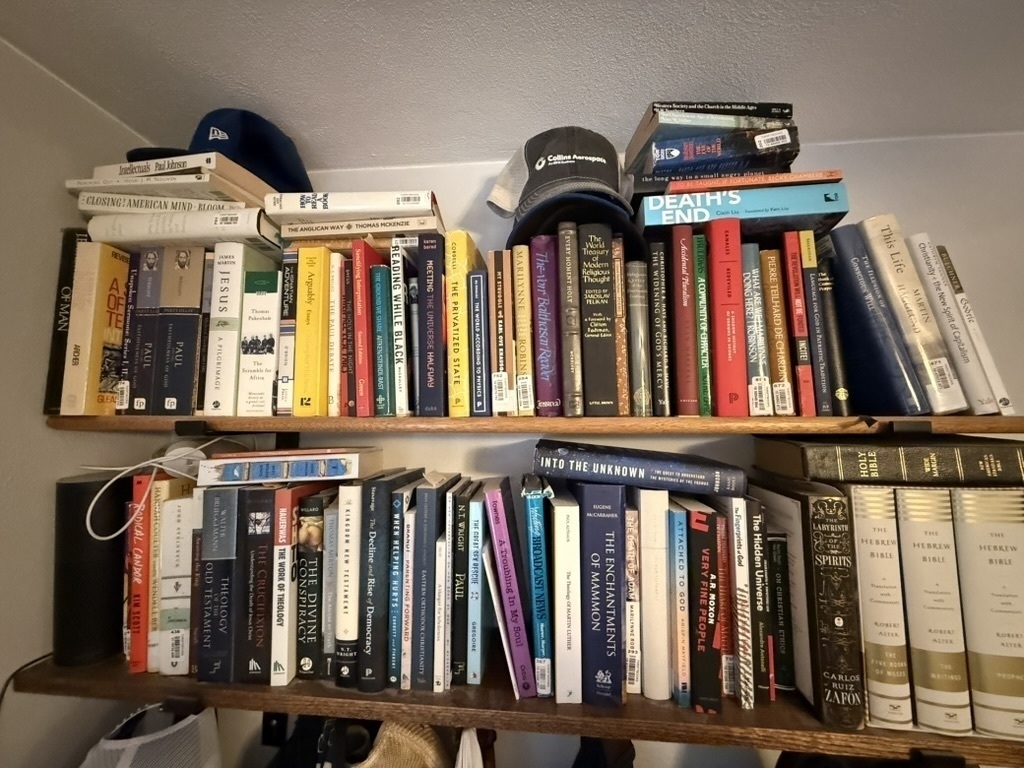Category: William Stringfellow
You are viewing all posts from this category, beginning with the most recent.
My 2024 Reading In Review
Another year full of books! (Previous summaries: 2023,2022, 2021, 2020, 2019, 2018, 2017, 2016, 2015, 2014, 2013, 2012, 2011, 2010, 2009, 2008, 2007…
I read 63 books for the year, a few less than last year. I keep saying I’m going to stop logging to Goodreads, but it’s so easy and I’ve kept track there for so long that I still do it. I also keep my Bookshelf site over on my own website which I prefer to link you to instead.
The list is almost exactly a 50/50 split between fiction and non-fiction.
Here’s the full list of reading, with particular standouts noted in bold:
Theology / Ministry
- Varieties of Christian Universalism by David W. Congdon
- The Lost World of the Prophets by John H. Walton
- Reading Genesis by Marilynne Robinson
- From The Maccabees to The Mishnah by Shaye J. D. Cohen
- A Window to the Divine by Zachary Hayes
- Wounded Pastors by Carol Howard Merritt
- Lamb of the Free by Andrew Remington Rillera
- Making All Things New by Ilia Delio
- Reaching Out by Henri J. M. Nouwen
- The Experience of God by David Bentley Hart
- The Hours of the Universe by Ilia Delio
- A Private and Public Faith by William Stringfellow
I wrote about the Zachary Hayes book this summer. It’s small and delightful. And I’m looking forward to revisiting Andrew Remington Rillera’s Lamb of the Free as a part of a book club starting next week.

Science and History
- The Kingdom, The Power, and The Glory by Tim Alberta
- Finding Zero by Amir D. Aczel
- The Murder of Professor Schlick by David Edmonds
- Ringmaster by Abraham Riesman
- The Grand Contraption by David Park
- Neurotribes by Steve Silberman (RIP)
- 3 Shades of Blue by James Kaplan
- A General Theory of Love by Thomas Lewis
- Space Oddities by Harry Cliff
- The Hidden Spring by Mark Solms
- Rise and Kill First by Ronen Bergman
- Black AF History by Michael Harriot
- Debt by David Graeber
Ringmaster is a biography/history of Vince McMahon and his WWE empire. It’s a must-read as we enter four more years of a Trump presidency that will be about image and story line rather than truth.
Graeber’s book was fantastic as social science but prompted me to think theologically.
Memoir and Biography
- This American Ex-Wife by Lyz Lenz
- The Exvangelicals by Sarah McCammon
- An Autobiography, or, The Story of My Experiments With Truth by Mahatma Gandhi
Other Miscellaneous Non-Fiction
- Cultish: The Language of Fanaticism by Amanda Montell
- All Things Are Too Small by Becca Rothfeld
- Never Split the Difference by Chris Voss
- How to Read a Book by Mortimer Adler and Charles Van Doren
Fiction
- The Downloaded by Robert J. Sawyer
- Hell Is a World Without You by Jason Kirk
- In Universes by Emet North
- Exordia by Seth Dickinson
- Through a Forest of Stars by David Jeffrey
- Sun Wolf by David Jeffrey
- The Practice, The Horizon, and The Chain by Sofia Samatar
- The Light Within Darkness by David Jeffrey
- The Future by Naomi Alderman
- Siddhartha by Hermann Hesse
- The Year of the Locust by Terry Hayes
- Martyr! by Kaveh Akbar
- The Revisionaries by A. R. Moxon
- Lincoln in the Bardo by George Saunders
- I Cheerfully Refuse by Leif Enger
- The Midnight Line by Lee Child
- Blue Moon by Lee Child
- Do We Not Bleed? by Daniel Taylor
- Heavenbreaker by Sara Wolf
- Red Side Story by Jasper Fforde
- Airframe by Michael Crichton
- Extinction by Douglas Preston
- Killing Floor by Lee Child
- Die Trying by Lee Child
- Moonbound by Robin Sloan
- Some Desperate Glory by Emily Tesh
- Creation Lake by Rachel Kushner
- 2054 by Elliot Ackerman
- Shadow of Doubt by Brad Thor
- Tripwire by Lee Child
- Spark by John Twelve Hawks (unintentional re-read)
Summary
I didn’t realize until I typed up the list for this post that I had run through so much fiction. Guess it was a year I needed some lighter reading. I did a quick count on the books on my to-read shelf and if I constrained myself to just those books, I might have it cleaned off by this time next year. (I mean, that’s unlikely, but it’s a decent goal.)

A Christian is distinguished by his radical esteem for the Incarnation
A Christian is not distinguished by his political views, or moral decisions, or habitual conduct, or personal piety, or, least of all, by his churchly activities. A Christian is distinguished by his radical esteem for the Incarnation - to use the traditional jargon - by his reverence for the life of God in the whole of Creation, even and, in a sense, especially, Creation in the travail of sin.
The characteristic place to find a Christian is among his very enemies.
The first place to look for Christ is in Hell.
— William Stringfellow, from A Private and Public Faith
Second-guessing God
Stringfellow is just full of good stuff. Still in Chapter Two of An Ethic for Christians an Other Aliens in a Strange Land, he says this about trying to understand God:
Biblical ethics do not pretend the social or political will of God; biblical politics do not implement “right” or “ultimate” answers. In this world, the judgment of God remains God’s own secret. … It is the inherent and redundant frustration of any pietistic social ethics that the ethical question is presented as a conundrum about the judgment of God in given circumstances. Human beings attempting to cope with that ethical question are certain to be dehumanized. The Bible does not pose any such riddles nor aspire to any such answers; instead, in biblical context, such queries are transposed, converted, rendered new. In the Bible, the ethical issue becomes simply: how can a person act humanly now? … Here the ethical question juxtaposes the witness of the holy nation - Jerusalem - to the other principalities, institutions and other nations - as to which Babylon is a parable. It asks: how can the Church of Jesus Christ celebrate human life in society now?
Stringfellow on Revelation
In the second chapter of William Stringfellow’s An Ethic for Christians and Other Aliens in a Strange Land, he continues to contrast the two cities mentioned in the latter half of Revelation: Babylon and Jerusalem. The Babylon of Revelation, he says, “is archetypical of all nations.” Those nations are principalities that, Stringfellow argues, by their very nature are anti-human; they serve themselves and work against that which is good. Jerusalem, on the other hand, is representative of Christians as “an embassy among the principalities” or as “a pioneer community”. (These phrases remind me instantly of N. T. Wright’s similar description of the Church in Surprised by Hope.)
But Revelation, says Stringfellow, cannot be read as a “predestinarian forecast”.
To view the Babylon material in Revelation as mechanistic prophecy - or to treat any part of the Bible in such a fashion - is an extreme distortion of the prophetic ministry….
A construction of Revelation as foreordination denies in its full implication that either principalities or persons are living beings with identities of their own and with capabilities of decision and movement respected by God. And, in the end, such superstitions demean the vocation which the Gospels attribute to Jesus Christ, rendering him a quaint automaton, rather than the Son, of God.
While my Calvinist friends will quibble with the thought that humans have “capabilities of decision and movement respected by God”, I find that last sentence to be a compelling thought - that the work of Jesus Christ redeeming the world is magnified if his work is redeeming free and willful men, and that if, as in the strong Calvinist view, the whole cosmic saga is already completely fixed in history, then Christ is, in a way, just one more player in a pre-defined role.
William Stringfellow: "An Ethic for Christians & Other Aliens In A Strange Land
Among the many Christmas gifts I received this year, I was quite pleased to get a book which had been sitting on my Amazon wishlist for several months: William Stringfellow’s An Ethic for Christians & Other Aliens in a Strange Land. I will confess to having been completely ignorant of Stringfellow prior to someone online (I forget who) recommending this book, but he seems to have been a fascinating fellow; an Anglican layman who graduated Harvard Law only to move to Harlem and doing pro bono legal work for racial minorities and sex offenders.
To quote Ben Myers excellent summary of Stringfellow’s emphasis:
The most striking feature of Stringfellow’s work is his powerful analysis and critique of the “principalities.” For him, the principalities are institutionalised forms of death. Institutions exist for the sake of their own expansion and self-perpetuation; they are not subject to human control, but are autonomous entities vis-à-vis all human agency. Human beings often believe “that they control the institution; whereas, in truth, the principality claims them as slaves” (Free in Obedience, p. 99).
I’m only 35 pages into this slim 150-page volume - having read only the introduction and Chapter 1 - but I’m immediately struck by how timely his critique of American government and corporate institutions is. Consider this:
The Fall is where the nation is… Americans have become so beleaguered by anxiety and fatigue, so bemused and intimidated, so beset by a sense of impotence and by intuitions of calamity, that they have, for the most part, become consigned to despair. The people have been existing under a state of such interminable warfare that it seems normative. There is little resistance to the official Orwellian designation of war as peace, nor does that rhetorical deception come near exhausting the ways in which the people have found the government to be unworthy of credence or trust. Racial conflict has been suppressed by an elaborate apartheid; products which supposedly mean abundance or convenience turn out to contaminate or jeopardize life; the environment itself is rendered hostile; there is pervasive babel; privacy is a memory because surveillance is ubiquitous; institutional coercion of human beings has proliferated relentlessly. Whatever must be said of earlier times, in the past quarter century America has become a technological totalitarianism in which hope, in its ordinary human connotations, is being annihilated. … Americans have been learning, harshly, redundantly, that they inherit or otherwise possess no virtue or no vanity which dispels the condition of death manifest everywhere in the nation. (p. 19-20)
If Stringfellow felt this strongly in 1973, what would he be thinking today in 2012?
An Ethic is not quick reading but to this point every page has been worthwhile.